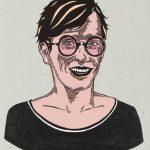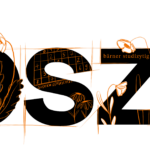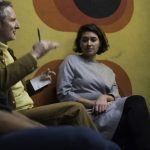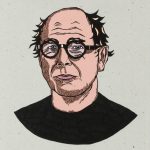Theatre: A Cultural Instrument to Resist the Occupation
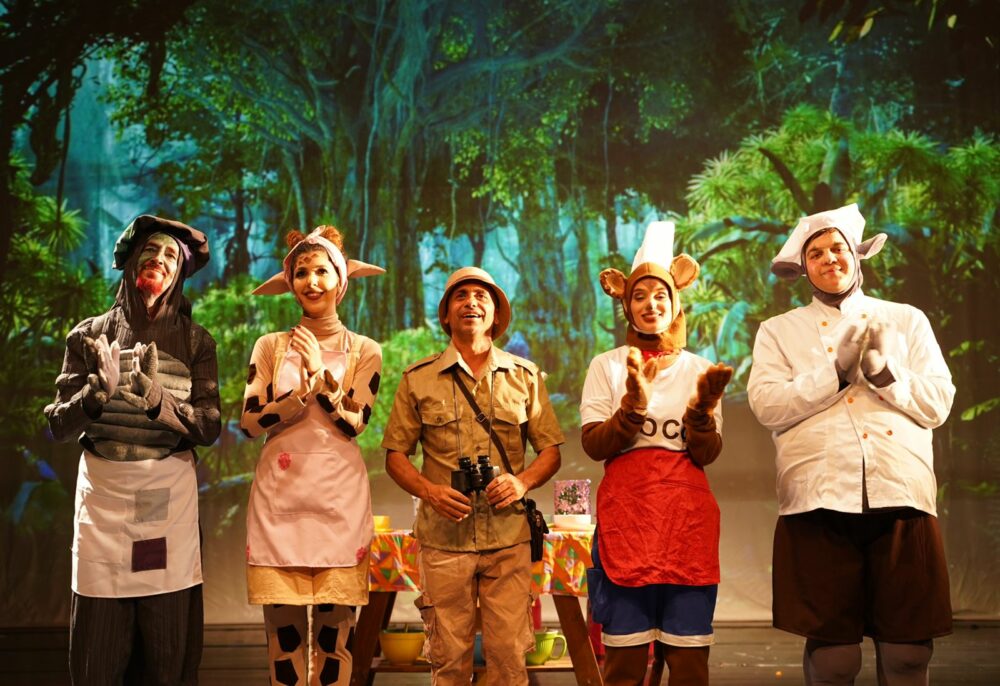
The atmosphere in Safar Café is delightful. People, mostly young women and men, are chatting with each other, enjoying a drink, some of them smoking argili, accompanied by slow music playing in the background. The owner of the café, Fadi Alghoul, takes a seat and instantly starts sharing his story.
Text: Robin Walz, Blog «A Global Perspective»
The Travelling Palestinian Theatre Group
As a son of Palestinian refugees, Fadi was born in Lebanon und grew up in a refugee camp. He would later study music and start working in a theatre in Jordan. When he was 20 years old, Fadi decided to move to Palestine to pursue his career as an artist, and that is precisely what he did. At the time of his arrival, the theatre and arts industry in Palestine was not highly developed. Despite the occupation posing obstacles for Palestinians and their culture, Fadi created the Safar Theatre Group in 2000 and it remains in existence to this day. The group started off producing many cultural activities for children, such as festivals, summer camps or musical shows, with the aim to entertain and to educate.
La“We use the theatre, the arts, to teach our children, our people through this way.”ter, the group would extend its target audience to youth and adults. Safar was by no means the first theatre group in Palestine, but it had a distinctive feature, which can be interpreted from its name. Translated into English, Safar means Traveling. As there was no proper theatre in Palestine and a lack of cultural infrastructure for performances, Fadi needed an alternative method to reach the audience.
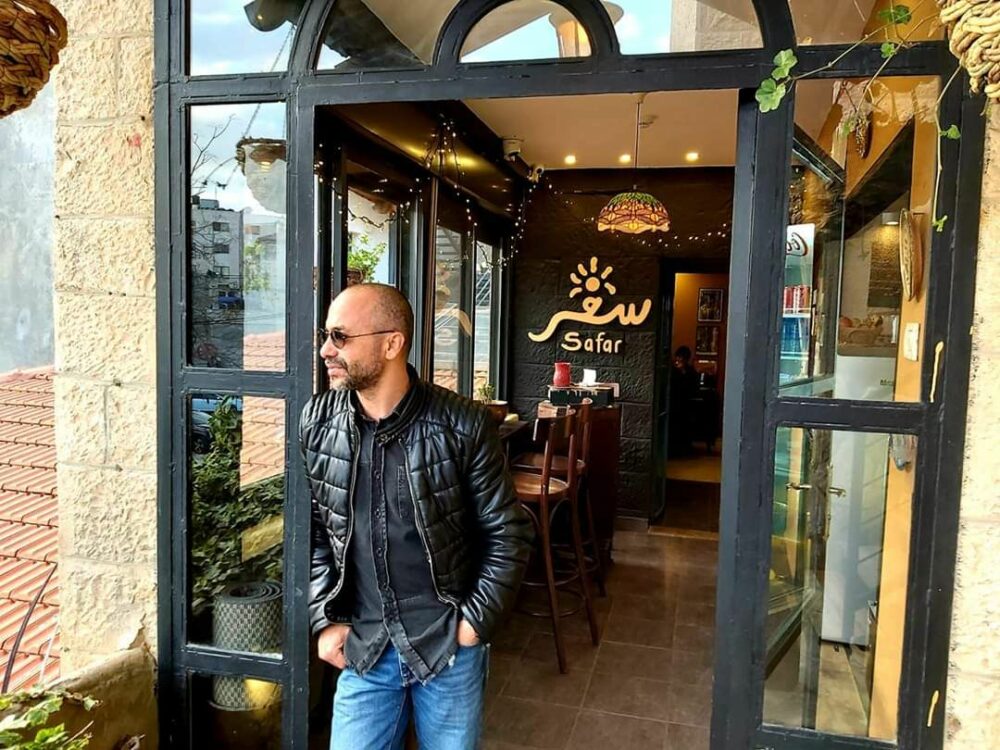
Fadi Alghoul standing in front of his Safar Café.
And so, he decided to deliver his theatre pieces to the audience, therefore making it accessible for children who would otherwise never have been able to see Safar’s performances and participate in its cultural activities. Safar started going to villages, schools, refugee camps, and many more places all over Palestine, mostly traveling by car. Until now, they make all the preparations necessary by themselves. They take care of advertising and media requests, carry the required equipment, set up the sound system, prepare the outfits, do the makeups for the actors. Finally, they act.
“We are like soldiers. Anyone who works in a theatre in Palestine is a soldier. I have problems with my back. We have problems, all of us. […] We do everything. Anyone who works at the theatre in Palestine should do everything because we don’t have a government who takes care of us. Our government is very weak. They don’t have the money and they don’t care about us.”
“We are like soldiers. Anyone who works in a theatre in Palestine is a soldier.“
His frustration with the system and the obstacles that the occupation poses did not impinge on his perseverance to create his own Palestinian theatre. It is impressive what he managed to build and achieve without any external support. As a result of this hard work, Fadi has carried out roughly one thousand performances, across the West Bank, including one in Gaza. For him, theatre is a tool to resist the occupation.
Fadi made a name for himself as his group became increasingly famous. From 2009 onwards, Safar started to gain international attention. They began traveling to other countries, especially in Europe and in the Arab world, where they were invited to share their work at festivals and theatres. Furthermore, they cooperated with foreign theatre groups such as Obgang2 Turnéteater from Aarhus, Denmark, performing together and implementing workshops in Europe as well as in Palestine. In some cases, their travels were funded by bigger foundations, other times they had to cover the costs themselves, forcing them to organize fundraising activities.
Safar Culture Café
In 2019, Fadi opened the Safar Culture Café, where he is sitting now, talking about his past, achievements and hardships. It is located near Ramallah Tahta, the downtown of Palestine’s administrative capital. The building was previously being used by the Safar Theatre Group, where they would come together to read, write, audition and rehearse their plays.
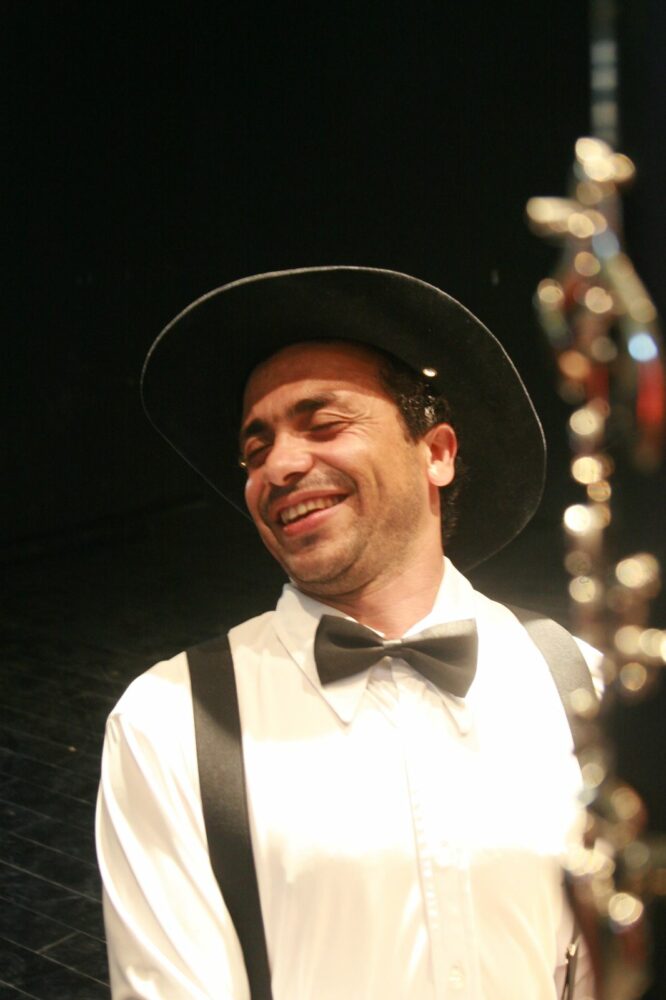
Fadi Alghoul chose arts and
theatre as a peaceful mean to
resist the occupation.
The main idea behind the café was to earn some money. This money is primarily used for his family and to make ends meet within the context of a difficult economic situation, rooted in the ongoing occupation and exacerbated by the covid-19 crisis. “Our problems with Israel – there is no stability here. That’s why I started thinking how I can do something different that gives me some money to feel good, to have a good life, a normal life.” Fortunately, he has also been able to put some earnings aside to invest in his Safar projects. The concept of the café, however, is quite unique.
He is convinced that in Palestine, creative individuals can achieve something big and trigger change.
Not only is it a place for young people to meet, but it is an open space for them to exchange and implement all sorts of cultural ideas. More specifically, this has resulted in many different activities, such as stand-up comedies, live music, meetings with artists, book openings or expositions, to name some of them. It must be mentioned that all of the events are offered to the public for free. The only profit they make is by selling beverages and snacks. “That’s why all the youth people like this place. They feel comfortable here, they feel at home. […] Everything is simple here, and original.”
A Man of Many Talents
Besides his theatrical and acting abilities, demonstrated through Safar and other theatre groups, as well through his career as a professional actor, Fadi has yet another talent: puppeteering. In fact, he started working as a professional puppeteer 25 years ago, especially with Shara’a Simsin and later Hikayat Simsi, two international co-productions with Children’s Television Workshop in New York City, which is responsible for the production of the popular educational children’s television show Sesame Street. In both co-productions, Fadi portrays Haneen, a lively five-year old female monster who is learning how to count, read and write. In contrast to the stereotypes of passive Arab females, Haneen believes that she can do anything, her motto being “I can, I can!”. “And then”, he explains, “I became a famous puppeteer outside Palestine, they call me all the time to go to Qatar”, where he does different characters for Jeem TV – Aljazeera’s children television channel. Ironically, at this exact moment his phone starts ringing. “I have to answer”. Fortunately, it is not another work call. He settled down in Ramallah, but he still travels a lot for work, making it difficult at times to be united with his family and his four children.
Childhood in Sabra and Shatila
Fadi’s passion for acting and theatre has its origins in a difficult childhood. It was one traumatic experience in particular that continues to affect him psychologically today. Fadi grew up in West Beirut, Lebanon – in the Sabra and Shatila refugee camps, more specifically. Following the Israeli invasion of Lebanon, on on the sixteenth, seventeenth and eighteenth of September 1982, as he precisely recalls, right-wing Christian Phalange militia stormed the camps and massacred the Palestinians living there.The exact numbers are vague, but according to the Arafat Museum in Ramallah, over 800 people were slaughtered, most of them civilians, including women and children. Other sources state the number of killed to be in the thousands. It is important to understand that the camps were surrounded from Israeli troops, who had previously invaded and occupied West Beirut, allowing the militia to enter and preventing the Palestinian refugees from leaving the camp. Clearly responsible for the killing of hundreds, possibly thousands of civilians, the international community has thus far failed to hold Israel accountable for yet another violation of international law.
“Would you like to share a little bit about your childhood in Lebanon and what happened?” “Yeah”, Fadi answers instinctively, but then tries to find the right words and pauses. Once again, his memories revive, and the dreadful images swirl in front of his eyes, rendering him speechless. He was just nine years old, when he was forced to witness his brother among many others being killed, and asserts that he himself should have been dead. He remembers all the details – the emotions of sadness, fear and uncertainty; the smells of death, the sounds of bombing, shooting, screaming, and sometimes unusual and horrible silence. “I talk about it all in my play”, in his “master scene”, as he calls it.
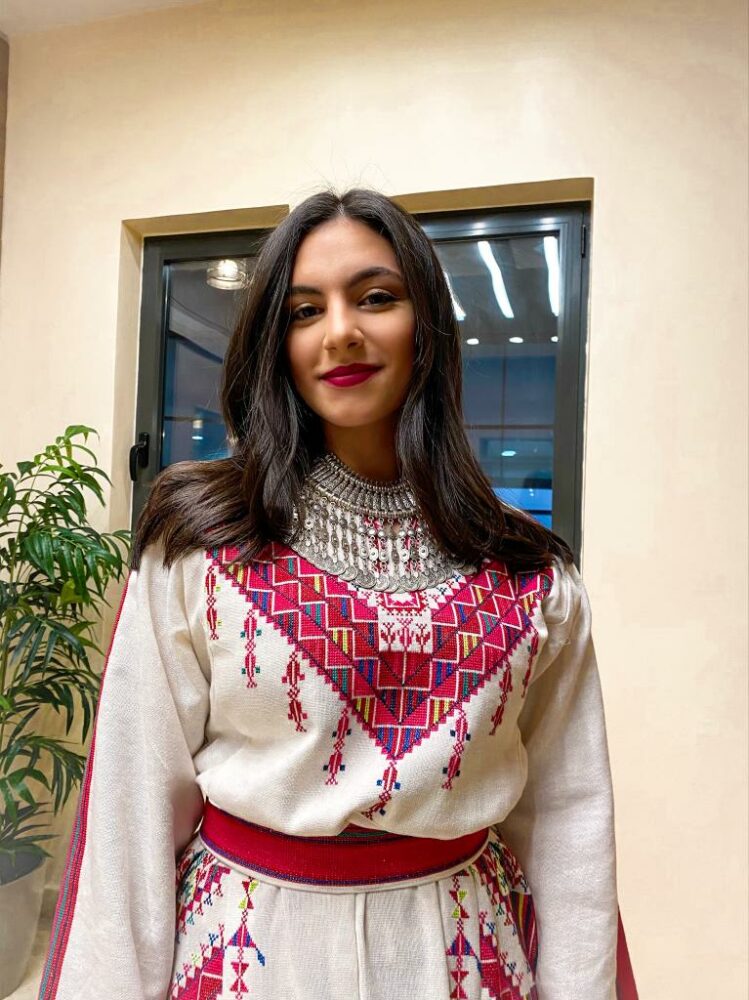
This is the story of Tara Shtayyeh, a
young Palestinian woman who studied
in the United States. During her time
abroad, she grasped the biased
Western media coverage and Western
misperceptions regarding Palestine
and Palestinians. Notwithstanding the
inaccurate reporting, in addition to
censorship of Palestinian content on
social media, Tara is fully committed to
repairing the narrative of Palestine.
Clarinet: A Weapon of Hope
The piece of art he is referring to is named The Clarinet. In the play, directed by Akram Al Malki, and written and performed by Fadi himself, he takes over a variety of roles, acting as his former self, as his father, as his grandmother, and many more. He adapts his voice and movement to the different characters he embodies, and he plays various instruments, including the clarinet. The play covers his childhood and his experiences during the massacre, manifesting many sensitive memories, such as constantly moving, hiding in his grandmother’s house and running from the attacks, or suffering from food and water shortage. “Sometimes, we drank sea water, I still feel the salt on my tongue”, he says in the play. But it also includes joyful stories, for example listening to Nora’s beautiful singing, who made him love music, discovering and learning how to play the clarinet, or playing with clay. Fadi’s mother, who died during the war before the massacre, used to shout at him when he would return home covered in mud because of the clay. At the end of the play, when it is “lighting all Shatila’s entrances” and Fadi miraculously manages to escape, he flees to the cemetery where his mother is buried, talks to her and gives her a truly heart-breaking message. “Miss you mom. Why did you leave me alone? They want to kill us. They follow us from place to place. They want to get rid of us. (…) Mom, I stopped playing with mud as I promised you. Remember when you used to punish me when I did. I am not mad. Come back and punish me. Just come back.”
Once again, his memories revive, and the dreadful images swirl in front of his eyes, rendering him speechless.
The main message of the play is to show the world what the Palestinians lived through, but also to demonstrate that they are still hopeful and from where they grasp this hope. “I chose the art to survive, I chose the clarinet. For me, I chose it because it’s like my weapon.” The clarinet symbolizes hope, and it can also be seen as a symbol for resistance against the daily hardships Palestinians suffer from the Israeli occupation.
Clarinet is an emotional theatre piece that was well received by the audiences. Translated into five languages, Fadi performed it more than two hundred times, repeatedly reliving the horrific memories with every performance. But Fadi has demonstrated incredible strength and resilience. His brilliance is reflected in his ability to turn a considerably haunting experience into an inspiring career. Clarinet is a sad, yet optimistic play, sending a strong message of hope. “I always believe in arts, in culture to change many things.” Furthermore, the play was, unquestionably, a way for Fadi to process his difficult childhood.
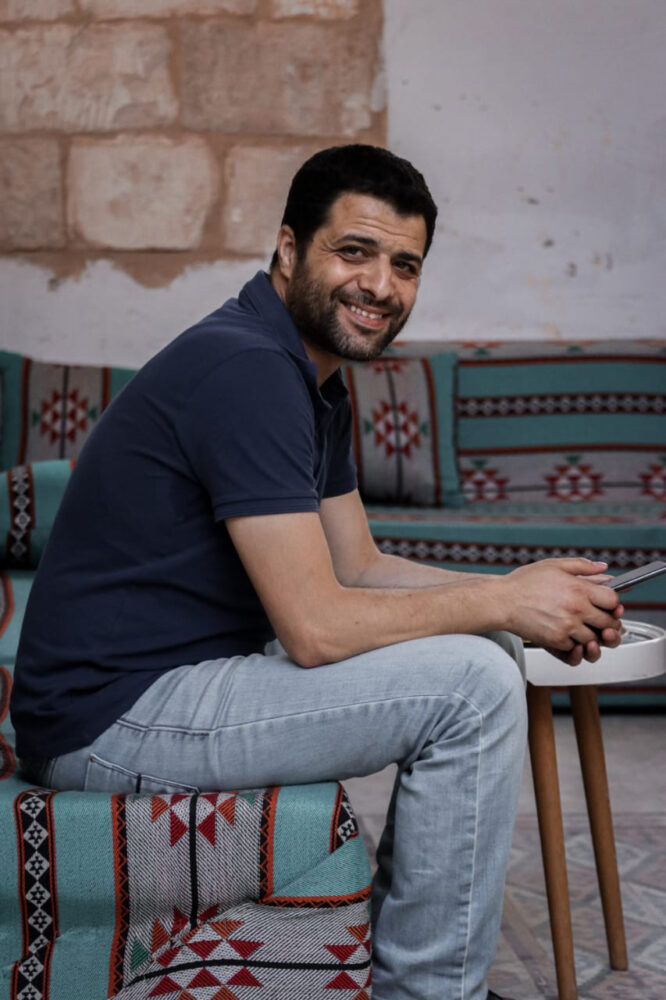
This is the story of Abdel-Rahman
Kittaneh, a Palestinian academic and
architect. Abed spent five years in
Israeli jail as a political prisoner, where
he learnt many lessons that would
inspire him to create The Yalla Project,
a community-based initiative. Despite
the challenges he faced along the way,
Abed has made an impressive
contribution to reviving the old town of
Nablus and helping others reclaim
their cultural heritage. This peaceful
approach is his way of resisting the
Israeli occupation.
An Inspirational Use of Arts to Resist the Occupation
Fadi started acting in theatre when he was 13 years old, just four years after the Sabra and Shatila massacre. Today, he is an experienced Palestinian artist, famous inside and outside Palestine for his work as an actor and puppeteer, but also for his impact on Palestinian theatre. “My name became famous because of the theatres, because I believe in my job, I believe in my work, I work hard with my heart.” However, he doesn’t view himself as just an artist. “I’m like a fighter, I’m a soldier. He is convinced that in Palestine, creative individuals can achieve something big and trigger change. Undoubtedly, his inspirational use of theatre will remain a source of hope to future generations and will encourage them to choose arts and theatre as a peaceful mean to resist the occupation.



